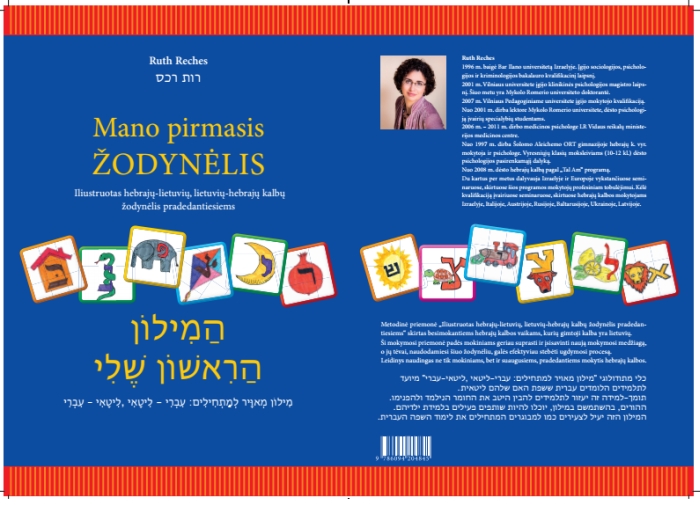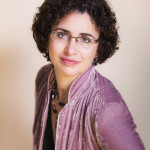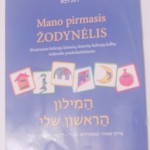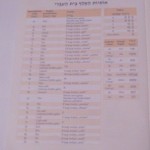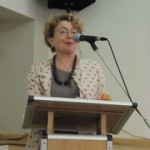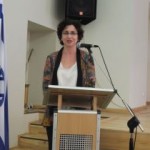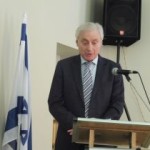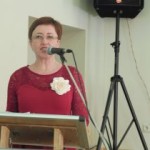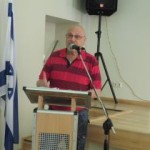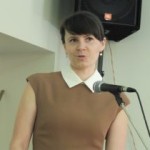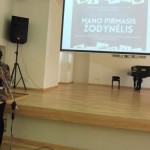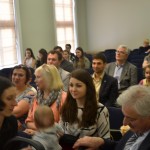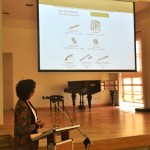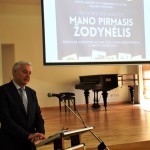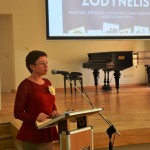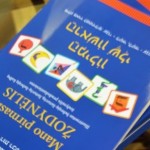The publication of Ruth Reches’s “Iliustruotas hebrajų-lietuvių kalbų žodynėlis pradedantiesiems” [“Illustrated Hebrew-Lithuanian Wordbook for Beginners”] is an important event for Jews and Lithuanians who want to learn Hebrew and who had to rely in the past on textbooks in Russian and English. The arrival of the book was eagerly awaited by the students of the Vilnius Sholem Aleichem ORT Gymnasium and their parents. The announcement of the book’s official launch instantly drew thousands of interested people on facebook from all over Lithuania. The author presented her book at the Community May 9.
Ruth Reches was graduated from Bar Ilan University in Israel in 1996 with a bachelor’s degree sociology, psychology and criminology. In 2001 she completed a master’s degree at Vilnius University in clinical psychology. In 2007 she received a teaching credential from Vilnius Pedagogical University. Currently she is doing doctoral work at Mykolas Romeris University, where she has been teaching psychology to students pursuing a variety of disciplines since 2001. She worked as a psychologist at the medical center of the Lithuanian Interior Ministry from 2006 to 2011. Since 1997 she has also taught Hebrew at the Sholem Aleichem Gymnasium in Vilnius and served as school psychologist. She teaches psychology as an elective to upper-level (sophomore to senior class) students there.
The “Illustrated Hebrew-Lithuanian Wordbook for Beginners” is for teaching Hebrew to children whose native language is Lithuanian. The learning aid will help pupils understand better and acquire new material, while parents can use the book to follow the progress of their children. The book is useful for adults beginning Hebrew as well.
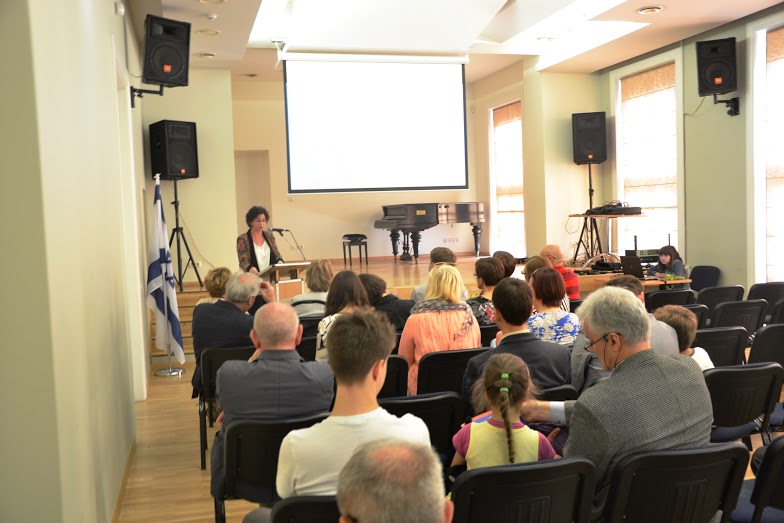
Reches thanked the Lithuanian Jewish Community, the Goodwill Fund and the director of the Sholem Aleichem Gymnasium for their financial and moral support in publishing the wordbook. Some of the features of the wordbook include providing an exact translation of the word being learned, its exact pronunciation and a clear definition in Lithuanian.
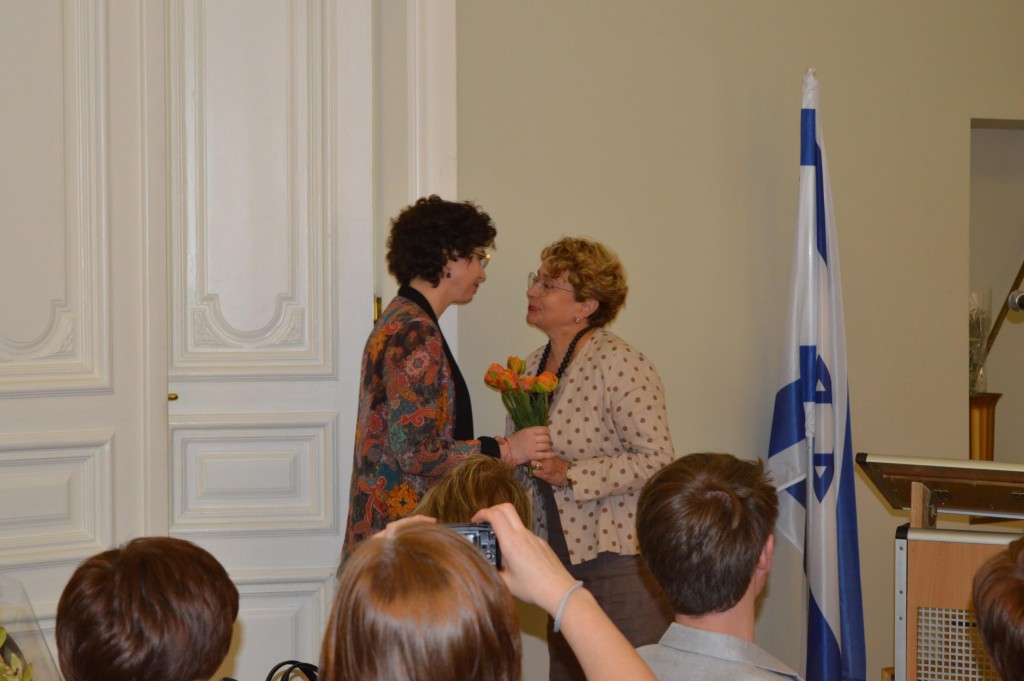
“We are representatives of the Jewish people, an old people who have lived and thrived for millennia,” Reches addressed the audience. “Every people have their state, culture and language. Living in Lithuania, far from our historical homeland, we can only remain Jews by cultivating our traditions. I believe, and I think you’ll agree, that all peoples must know their own language, must safeguard it and pass it on to future generations. The Hebrew language has been called a linguistic phenomenon. The language was dead, but now it has been resurrected and lives alongside all the other languages of the world. Eliezer ben Yehuda revived it, and today we, teachers of the Hebrew language, students, linguists–each of us pay tribute to it in our own way, giving thanks, if you will, for our language raised from the dead.”
Reches said she felt lucky and grateful for being able to teach Hebrew to the children at the Sholem Aleichem Gymnasium. She said she enjoys teaching and every day with the children brings new experiences and the positive energy radiating from the children. She said she had learned through contact with children what they need and what they lack. That’s how the Hebrew-Lithuanian wordbook came about.
“Children at the Sholem Aleichem Gymnasium study Hebrew from first grade to grade 12. I thought we need an aid to help children take in the material taught. Under our teaching methodology, we present all material in Hebrew. So situations have arisen where a child doesn’t exactly understand the meanings of words which he should understand seeing pictures and knowing the general context.”
Sometimes children encounter difficulties in doing their homework. The wordbook should help the child better understand the meaning of the texts being read and enrich his vocabulary. Illustrations are provided next to words in the wordbook. They were carefully considered, and will stimulate associative memory which is extremely important in learning foreign languages and for the creative abilities of students. This wordbook is necessary for students’ parents as well. Reches said: “every year when they take their children to first grade, parents worry they won’t be able to help their young ones learn the Hebrew language, so the wordbook should be an aid to the parents and calm their anxieties. The wordbook will allow parents to follow and supervise the learning process and will help parents help their children in learning words and doing their homework. We live in Lithuania and the native language of most our students is Lithuania, and if Russian is spoken at home, children don’t learn to read Russian, so all Hebrew-Russian dictionaries at school aren’t appropriate for the children. When I began writing the wordbook, I though it would be for first and second graders, but now I realize older children are using it, too, and their parents, people who are beginning to learn Hebrew.”
The wordbook begins with the alphabet with the names of the characters and their pronunciation, vowel diacritics and the personal pronouns with gender. Then there are words according to the Hebrew alphabet which children learn according to the curriculum and textbook. After the alphabet the words are arranged thematically, in the categories of family, weather, colors, numbers and so on. The end of the wordbook has a Lithuanian-Hebrew lexicon with page numbers to entries in the main body of the book. The author thanked her colleagues who edited the book as well. Checking and correcting every single word was difficult work requiring great attention, including checking diacritical marks and adding stress marks in the phonetic transcription in Lithuanian.
“I say thank you my colleagues, to the teachers Saulius Skučas, Yuda and Ana Vagner, and to the eighth-grader Edvardas Eigminas. And I also thank my students who drew the illustrations for the cover.”
Sholem Aleichem Gymnasium director Miša Jakobas said the children really like working with teacher Ruth. She’s calm, humble and works carefully, and the children seem to have less anxiety speaking with her. She’s also an exceptional teacher in that she completed university in Israel.
Indrė Misiūnienė, the mother of first-grader Martynas, began to learn Hebrew together with her son, and can testify to the usefulness of the wordbook from firsthand experience. She said the Hebrew language had begun to reveal its philosophical layers and its intimate relationship with numerology, and that she has begun to sense the chemistry of the language.
Ana and Yehuda Vagner, Hebrew teachers and colleagues of the author, said Reches was highly qualified and the work putting together the complex wordbook was done very well. Now it is a teaching aid and working with is a pleasure, they said.
The entire set of wordbooks brought to the presentation sold out immediately, but those who didn’t manage to get a copy can purchase one at the Bagel Shop Café at the Lithuanian Jewish Community located at Pylimo street no. 4 in Vilnius.


